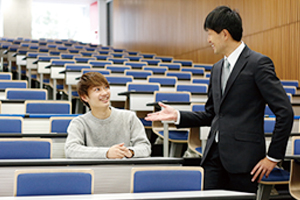Overview of Faculties
Faculty of Letters

Pursue Your Research on Japanese Culture
As the globalization is advancing and people with different histories and cultural backgrounds are living together, it is necessary to have human resources who have a deep understanding of Japan's unique culture and history and can communicate this to the world. The Faculty of Letters fosters a deep understanding of Japanese literature, language, history, and culture, as well as an ability to express oneself, to think scientifically, and to grasp the essence of things, and fosters human resources who can think and solve problems creatively by utilizing their specialized knowledge.
There are three courses in the Faculty of Letters. Japanese Literature Course, Historical Literature Course, and Architectural Aesthetics Course.
Faculty of International Studies

Explore the Challenges and Solutions of the Next Generation from a Global Perspective
In the Global Studies course, students will acquire the ability to observe and solve problems from a global perspective.
Students will also learn about business and social issues, aiming to develop leadership in the global context.
In the International Culture course, students will attain international perspectives through comparisons with Japanese culture. They also aim to acquire advanced communication skills.
Faculty of Law

Developing professionals who have a legal knowledge and can solve problems
They will acquire legal knowledge, including specialized knowledge of law, basic matters that form the basis of legal knowledge, and methods of reasoning, as well as the ability to apply this knowledge to various situations in society.
The faculty trains students to become professionals who can accurately handle legal tasks and problems that arise on a daily basis in various fields of society.
Faculty of Psychology

From business to human relationships,
learn psychology that can be used widely in society.
Psychology is the study of the mind and behavior of people, and can be applied to a variety of areas including crime prevention, as well as love and other human relationships, education, and marketing, to help establish a better society. The Faculty of Psychology offers four courses that cover these various academic disciplines of psychology. Students select the courses that interest them and pursue studies in the relevant areas of expertise. In parallel with the course study, they start “three practical programs" in their junior year to learn skills to make practical use of the expertise through interaction with the study in the four courses. In accord with their individual targets, students acquire psychology skills that can be used in every aspect of society.
Faculty of Sociology

Any field related to daily life can be a research subject.
Analyze society from a flexible perspective according to your interest.
Sociology is a study that starts by paying attention to familiar issues. Sociological study may also include selecting as a subject, for example, a trend, or your relationship with others, understanding its background, recognizing it as a social phenomenon and analyzing it as a tendency. From such familiar events to big issues such as poverty and wealth gap problems, as well as politics, the subjects of sociology are wide ranging. The Faculty of Sociology offers five education programs that comprehensively cover all research fields. It is a feature of the programs that students can select research fields from each program according to their interests, and study them with longitudinal and cross-sectional approaches. They will gain a bold and flexible perspective and learn skills in observing, surveying, analyzing and examining human behavior.
Faculty of Economics

Learn systematically and in depth economics that can be used in the real world.
Achieve the career you want.
Economy is a mechanism for generating products and services necessary for human life and spreading and using them to create a flow of money. Economic movements bring about various effects and changes in our lives. The Faculty of Economics aims to postulate aspects related to the economy, and discover and verify the laws in order to make use of them in the real world. The curriculum of this faculty offers five courses that connect the respective fields with future career paths, as well as four programs aimed at further developing expertise. By combining them, students can learn economics systematically and in depth.
Faculty of Management

Companies and business management are studied from various perspectives, ranging from management and marketing theories to law and psychology.
The profits of a company depend on sales of products and services. To generate and maintain high profits, it is necessary to have the knowledge to effectively distribute and use management resources such as goods, people, money and information. Accordingly, the Faculty of Management adopts a "major" system that facilitates systematic study of wide-ranging fields including organizational management, accounting, the law related to business management, and marketing to provide attractive products, as well as the information technology and human psychology necessary in the business scene. In the four majors of the Department of Management , students can deepen and widen their expertise.
Faculty of Regional Development Studies

Aim to contribute to the "vitality" of local communities.
Cooperate with local people and organizations and work for various projects.
Students develop practical learning activities to help local communities grow and solve problems, such as undertaking field work in urban spaces, planning trips to visit World Heritage sites and making proposals for new goods using local specialties. Through these activities, they acquire knowledge and skills to cooperate with people and organizations, and cultivate the ability to work to solve local problems from various perspectives. The goal is to develop the next generation of leaders who can become rooted in a local community, create connections with people and organizations, link the local community with the world and generate "vitality" in the local community.





